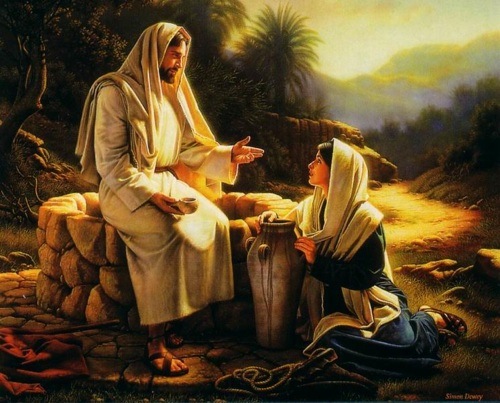For the Third Sunday of Lent we pause briefly on our pilgrimage toward Jerusalem in order to contemplate Our Lord’s encounter with the Samaritan Woman. It’s a good opportunity to recall our own encounters with the Lord. Ultimately we are thirsting for God and his love, and Lent is a time to return to the well in order to satisfy that thirst again, accepting no substitutes.
In today’s First Reading the Israelites are thirsty and fed up. They rebel against Moses, who is afraid they’ll kill him, and almost rebel against the Lord. They question whether God is even there. That shows the thirst they really have: for God. His presence, his attention, his aid. They don’t perceive his presence, just their need, and their hearts have become hardened by their experiences and frustration. Sometimes we thirst for something more, but we seek to slake our thirst in the wrong way. That is a recipe for dissatisfaction and a hardened heart.
In today’s Second Reading Paul reminds us that our true thirst goes beyond just seeking the fulfillment of material needs. The Holy Spirit pours God’s love into our hearts. It is God’s love that satisfies our true thirst. When we’re filled with his love and his grace we’re at peace. No grumbling. Everyone thirsts for love, but not everyone realizes that the love for which they thirst is the love of God. Yet, if there is an issue the problem is us, not him: Our Lord offered his love for us even when he had no idea or desire for his love, while we were still “enemies” due to sin.
In today’s Gospel the Samaritan woman epitomizes someone who was looking for love in all the wrong places. Yet love came to meet her unexpectedly. The Samaritan woman knew the religious traditions of her people, so she had an idea of the importance of God in her life, yet something had not clicked. She knew her religion, but she also experienced rebellion in her heart against God’s will regarding marriage, which is why she starts to give Our Lord some attitude. Where does this Jew, and a Jewish man no less, get off talking to her and asking for a drink? Today’s Psalm reminds us that if today we hear the voice of the Lord we must not harden our hearts like the Israelites did. The Samaritan woman’s experiences have hardened her. In today’s Gospel we see two thirsts seeking each other out. Each one seeks the other in order to satisfy its thirst. The Lord has a great thirst for our faith and our love. The Samaritan woman has a thirst for real love.
Our Lord today knows he is dealing with a hardened heart frustrated after a long time looking for love in all the wrong places. Therefore he knows when to be tactful, addressing her true thirst, but also blunt, telling her the mistaken ways she tried to slake her thirst. He comes to meet her at her level. The Lord often avoids the Messianic titles of his time because his contemporaries see the Messiah as someone simply social and political, but when the Samaritan woman asks him if he is the Messiah, he responds without hesitation: “I am he, the one speaking with you.” The Samaritan woman has found that for which she was truly thirsting, and has to share the news.
Through meditating on this passage you can open your heart so that the Holy Spirit can refill it with God’s love: “like the Samaritan woman, let us also open our hearts to listen trustingly to God’s Word in order to encounter Jesus who reveals his love to us and tells us: ‘I who speak to you am he’ (Jn 4: 26), the Messiah, your Savior” (Pope Benedict XVI, Angelus, 2/24/2008). Wells are not meant to be used just once. Like the kitchen faucet we go to them over and over, because our thirst for God is continuous in this life. Let’s seek the waters of life that flow today and forever from Our Lord.
Readings: Exodus 17:3–7; Psalm 95:1–2, 6–9; Romans 5:1–2, 5–8; John 4:5–42.


